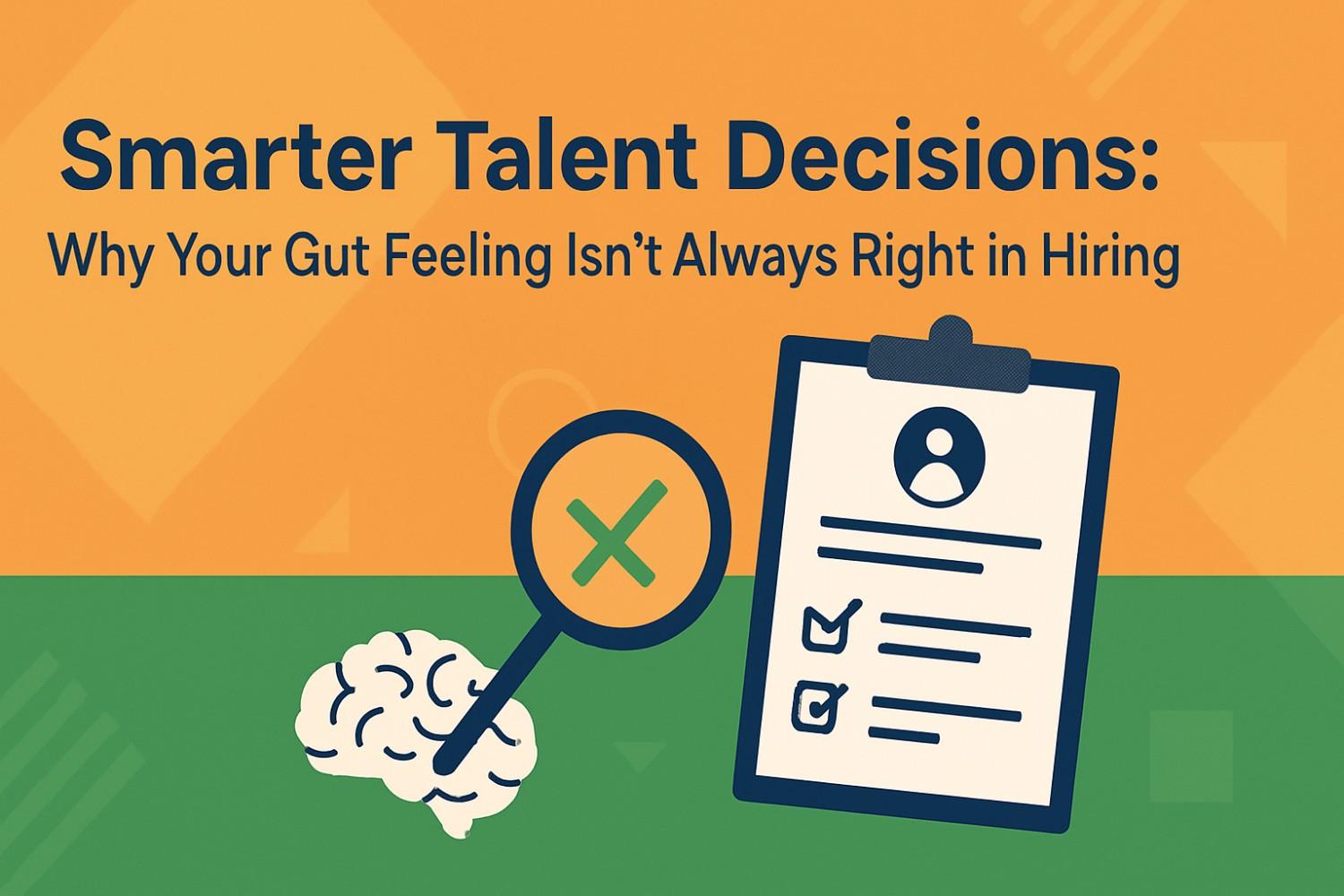Smarter Talent Decisions: Why Your Gut Feeling Isn’t Always Right in Hiring
You’ve probably been there before. Sitting across from a candidate, resume in hand, something just feels off. Maybe they hesitated a bit too long. Maybe their body language wasn’t quite what you expected. And boom your gut screams, “This isn’t the one.” But here’s the kicker: what if your instincts are wrong?
Don’t get me wrong. Intuition plays a role in hiring it always has. We’re human, after all. But relying on gut feeling alone can quietly sabotage your hiring process and cost you some of the best talent out there.
Let’s dig into why that happens and how to balance instinct with smarter, data-driven decision-making.
The Gut Feeling Trap
We all love to think we’ve got great instincts. “I know it when I see it,” right? But in reality, our gut feelings are stitched together from subconscious biases, past experiences, and yes sometimes plain assumptions.
That quick decision about someone’s potential? It’s often shaped by things that have nothing to do with the actual job requirements like tone of voice, eye contact, or even whether they remind you of someone else (good or bad).
Here’s the surprising part: studies show that unstructured interviews the ones where gut feelings take the lead are far less predictive of job success than structured ones. So, while it might feel empowering to “trust your instincts,” you could be closing the door on someone truly exceptional.
What Your Instincts Might Miss
Let’s say you pass on a quiet candidate because they didn’t “sell themselves.” What you might’ve missed is that they’re a powerhouse once they’re settled in. Or maybe you lean into charisma and hire someone who ends up lacking the follow-through your team desperately needs.
Here are some key areas where gut feelings often fail:
- Introverted personalities: Not everyone shines in interviews some thrive in execution, not performance.
- Cultural bias: We tend to favor people who share our background or communication style, which can lead to a lack of diversity.
- Overconfidence in pattern recognition: Just because someone reminds you of a great hire from the past doesn’t mean they’ll deliver the same results.
Hiring Isn’t About Magic. It’s About Alignment.
What makes a great hire isn’t some “spark” you feel; it’s alignment. Between the candidate’s skills and the role. Between their values and your culture. Between their career goals and your company’s trajectory.
And to discover that alignment, you need more than gut instinct you need structure.
That’s where tools like structured interviews, scorecards, and job simulations come in. They give you consistent criteria to evaluate candidates, helping you stay focused on what actually matters: capability, adaptability, and value fit.
The Power of Data + Intuition (Yes, You Can Use Both)
Now, I’m not saying throw your intuition out the window. But it should be your co-pilot not the one driving the car.
Imagine you’re interviewing someone who seems a little reserved. Your gut says, “Hmm, maybe not a culture fit.” Instead of ruling them out, you look at their skill test scores. You check their references. You ask follow-up questions. And maybe just maybe you discover they’re exactly what your team needs.
When used alongside clear hiring data, your instincts become sharper and more informed. That’s where real hiring magic happens.
Real-Life Hiring Regrets (We’ve All Been There)
We’ve heard it again and again from hiring managers:
- “I passed on a candidate who didn’t ‘wow’ me in the interview… but they went on to do amazing things elsewhere.”
- “I hired someone because we clicked immediately, but it turned out they weren’t great at taking feedback.”
These stories are real, and they highlight the risk of relying too much on gut and not enough on structure.
5 Ways to Make Smarter, Balanced Hiring Decisions
Let’s keep it practical. Here’s how to bring clarity and confidence into your process:
- Use a structured interview format: Ask every candidate the same key questions. This keeps things fair and measurable.
- Score candidates against clear criteria: Define what success in the role looks like then stick to it.
- Incorporate skills-based assessments: Real tasks reveal real ability.
- Run blind resume reviews: Strip away names and personal details to avoid unconscious bias.
- Reflect on your gut don’t just act on it: Ask yourself, “Why do I feel this way about this candidate?” and challenge your assumptions.
From Hiring Guesswork to Hiring Genius
When you stop making hiring decisions in the heat of the moment and start layering data over instinct, things shift. You begin to hire people who not only look good on paper or feel like a “fit” but who actually thrive in the role.
It’s not about being perfect. It’s about being intentional.
Because hiring isn’t just about choosing the most impressive resume or the most charming interviewee. It’s about building teams that grow, perform, and last.
And that takes more than gut.
Final Thought: A Gut Check for Your Gut
Next time your instinct pipes up during an interview, listen but don’t let it take over. Back it up with data. Ask questions. Stay curious.
Because when you do that, you move beyond guesswork and into the kind of hiring that truly transforms your team.
Explore More!
📘 Read the Insights Blog
💼 Browse Live Job Openings
“Need help hiring smarter? Learn more about our recruitment services!
Follow Reqroo
Stay ahead in hiring with the latest recruitment insights, talent acquisition hacks, and smart hiring trends. Let’s help you find the right people faster.
Got a hiring challenge or want to stay updated with proven recruitment strategies? Follow us on LinkedIn @Reqroo or subscribe for expert tips we don’t share anywhere else.
Questions? Just drop us a message. We’re here to make hiring a whole lot easier (and way less stressful).

